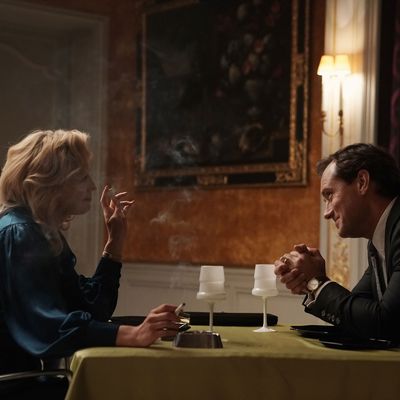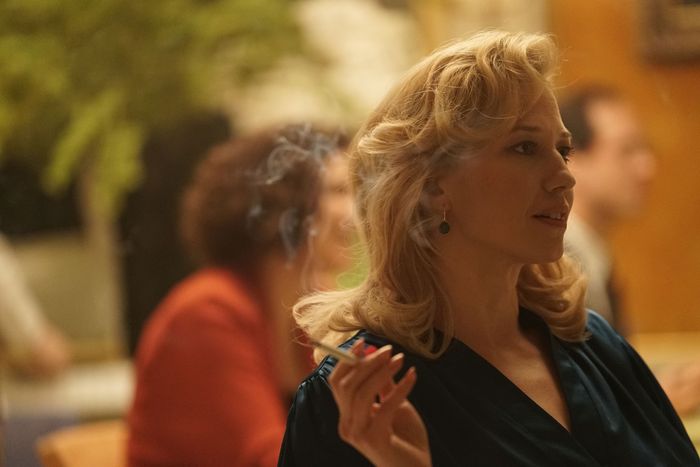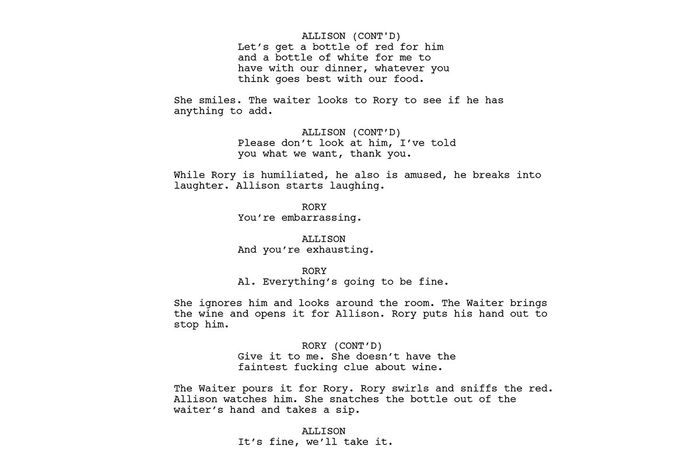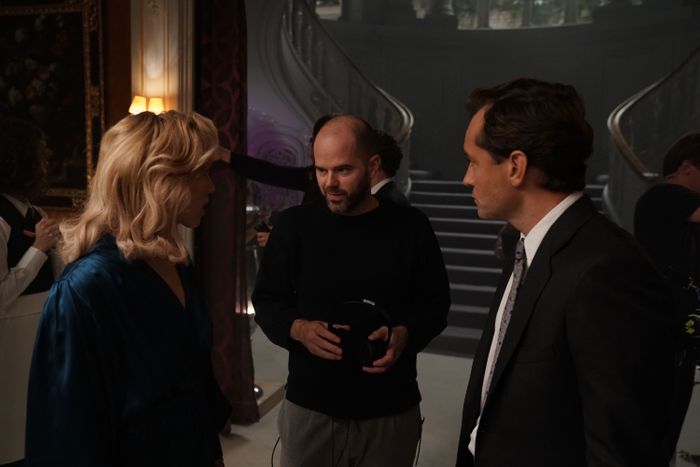
The best scene in The Nest takes place in a luxe London restaurant that the main characters can’t really afford. The film is set in the ’80s, and the eatery embodies the decade’s fine-dining ideals, all gilt trim and Chateaubriand. Rory O’Hara (Jude Law) and his wife, Allison (Carrie Coon), appear to be right at home there, gleaming in period-appropriate finery, but by this point in the movie we’ve started to understand how fragile their façade of wealth actually is. The O’Haras are living a high-end paycheck-to-paycheck existence, barely able to keep up with the rent on the cavernous manor house they’ve moved into with their two kids, much less manage to buy the Mayfair pied-à-terre they’ve just come from viewing. The dinner they’re about to have will leave a serious dent in the £600 left in their account, something Rory is in deep denial over and that Allison needles him about with the spite of someone who’s been in this situation before. Then they get into it anyway, in a short, sharply written sequence that illuminates so much about their marriage.
The Nest, which was written and directed by Sean Durkin (of Martha Marcy May Marlene fame) is about a family of four that implodes after moving from New York to the U.K. so that Rory can chase a financial opportunity in the country in which he was born. But more than that, it’s about the relationship between two people caught between eras and expectations. Neither Rory nor Allison actually comes from the kind of money they pretend to have always been around. They’re savvy performers, though Allison’s been following Rory’s lead — accommodating his habitual bluffs and bailing them out of his failed ventures — for long enough to feel punchy and done with the constant charade. Coon and Durkin spoke to Vulture about this scene, smoking, and how a couple’s power dynamics can be explored and upended by a mere act of ordering a meal.
The restaurant scene takes place 45 minutes into the movie — what were the conversations like in terms of preparing for it?
Sean Durkin: It was a very essential scene for me, in the sense that I wanted to show how loving and fun that relationship is. Even at a moment where there’s a fight brewing and a tension growing, they’re still able to have this good time and play with each other. It’s a bit of a game; they know how to play it together.
Carrie Coon: One of the things that struck me was how Allison was playing Rory’s game, and was besting him at his own game in that moment, which was a lot of fun to do. I felt that those scenes lent a sense of history to the relationship. You do have a sense of just how well-matched they are, which I hope has the audience rooting for them even as things feel like they’re disintegrating. It was one of the wackier ’80s sets, even though it’s still tasteful in the film. I remember walking into the set and feeling really transported, which was helpful.
Durkin: Yeah, it was the only time we embraced the louder side of the ’80s, really. We imagined it being a new restaurant that maybe didn’t last very long.
Coon: Those cigarettes, the fake ones, ash, so much that my ash was already about an inch long 30 seconds into the scene, and I set the tablecloth on fire.
The smoking serves as a way of channeling Allison’s energy throughout the film. But in this scene it almost feels like a weapon she’s wielding, as she and Rory engage in this bit of warfare across the table from one another.
Coon: Sean and I both grew up in households with smokers. There is not a photograph of me from ages 0 to 7 where somebody is not smoking in my face. I grew up in a house with two parents who smoked inside. So if you’re going to make a film in the ’80s, it felt essential to us. It was often scripted, and there was only one time where the smoking got cut — generally we always defaulted to it. That’s where I felt most like I was one of those old-school movie stars. To sit at a table and look somebody in the eye and smoke like that, it’s just not something you get to do anymore.
Durkin: It was just a huge part of that time. My mother, my sister, my aunt — there was just a nonstop cloud of smoke. My dad smoked cigars. I got ridiculed for being bothered by it.
Coon: Yes, me, too! I will say, it affects the rhythm of the scene. Almost every beat you see onscreen is scripted. There’s very little that Jude and I are inventing in the moment, because when a script is well-written, that structure feels organic and make sense; there’s really no need to step out of it. There’s a lot of patience actually, at the top of the scene. That’s part of the tension that builds to this climax, which is a rapid-fire order, and then that gesture with the wine bottle.
There’s a complicated play of power dynamics in this scene. There are times when Allison is expected to play the trophy for Rory — this “beautiful blonde American,” as he puts it, that he talks about wanting to show off. And here she violates that implicit contract by humiliating him by ordering for him.
Durkin: It is her playing that role, and feeling almost a duty to it in being his wife. But he also loves that she is this way. That was really important to get across, that there is that conflict within them. He wants her to be [the trophy wife]. But he also loves the fact that she’s doing this.
Coon: He would have been bored with a woman who just played the part.
Durkin: They have this set of values that have been passed on to them by the previous generation, the culture they grew up in. But then there’s this more true nature that each of them has, that is much more egalitarian and loves the fact that each is more outspoken than, maybe, some of their peers.
And Jude has that small smile in the end. Throughout this scene, you’re reminded that both of these people are performing being part of a class that neither actually grew up in, because they’re breaking character. Rory makes that comment about how little Allison knows about wine, which prompts her to grab the bottle from the waiter and drink right out of it.
Durkin: It’s about the exhaustion of this aspiration — that dream of bigger and better around the corner that doesn’t really exist. A lot of that stems from Rory. He’s so concerned with not being in the place he came from that he doesn’t know who he is.
Coon: And Allison’s more grounded, but she’s very enrolled in this aspiration as well. It’s very easy to be seduced by a dream. It’s very easy to go along with it until it gets uncomfortable, and then to turn around and point a finger at the other person. She is complicit in their irresponsibility, and that’s part of what makes her a challenging character — she’s filled with contradictions.
You also get the sense of how much Allison’s caught between two generations with different ideas about gender roles. Her mother tells her, “It’s not your job to worry; leave that to your husband.” Her teenage daughter taunts her about letting men make decisions for her. Allison seems so aware of this pressure from both directions, but unclear on what she wants for herself.
Coon: I really responded to that aspect. My grandmother was a real groundbreaker who wore pants as a science teacher and almost got fired because she was taking her kids outside to shoot up rockets. The other women in the neighborhood looked askance at her because she’d be outside putting up the mailbox because my grandfather was not a handyman. And yet — she was expected to dress up and wear makeup every day. She wore makeup when she was in hospice.
As a woman, I saw those contradictions existing in her. And when I was in college, she said to me, “If you can learn to say no now, you will be so far ahead of me.” To know that this powerful woman was still struggling to say no was shocking and illuminating. Because we do not have access to that still, small voice when we are taught to say yes and to make waves and to follow along. We’re taught that we’re going to disappoint people. When we finally start to come into our own, we don’t even know what that voice sounds like, and we don’t know what we want.
To see a woman who has ambition and skills trapped in that same convention felt very truthful to me. To feel that so truthfully conveyed in this movie about a marriage that didn’t have a divorce, the death of a child, or infidelity in it felt deeply authentic to the experience of the women in my life that I admire, and that I also criticize for their choices.
To read the entire scene as it was conceived by Durkin, check out the script below. The dinner scene begins on page 48.





